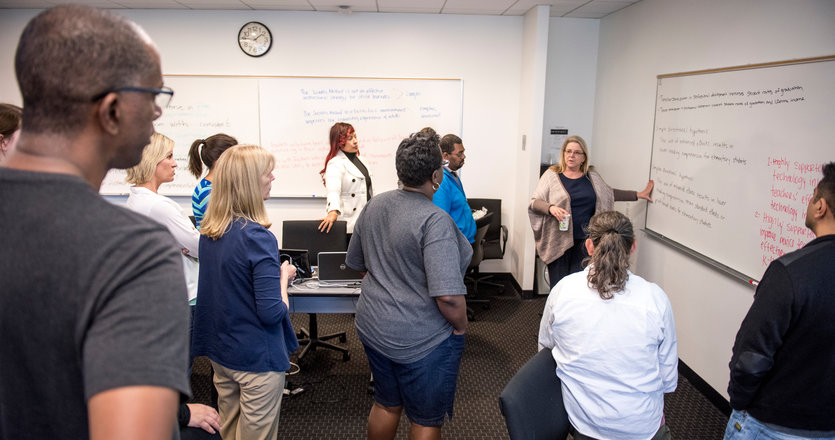Leading Student Services in Educational Institutions
 The Director of Student Services plays a pivotal role in shaping experiences for students.
They are a cornerstone for academic, emotional, and social support systems within
an educational institution.
The Director of Student Services plays a pivotal role in shaping experiences for students.
They are a cornerstone for academic, emotional, and social support systems within
an educational institution.
Read on for more information about the responsibilities, qualifications, and impact of being a Director of Student Services. You’ll gain further insight into how a Master’s in Education with a concentration in Leadership in Higher Education can prepare you for this rewarding career path.
What Does a Director of Student Services Do?
Directors of Student Services (also sometimes also called Student Success Coordinators) are essentially the glue that holds the educational experience together for the student body. Think of them as the architects of the school community, crafting spaces and programs where students can grow in every aspect of their lives. It's an essential duty that goes beyond administration—it's about nurturing an environment that promotes not just academic growth, but emotional and social wellbeing, too.
Responsibilities
Read a job description for a Director of Student Services position and you'll quickly realize that the role is incredibly diverse, touching every facet of the educational journey. Their duties may range from managing academic advising to overseeing school nurses, making sure students have access to medical care and reasonable accommodations as required.
Other special duties such as helping with financial aid, career services, and student activities also fall under their umbrella. They also work closely with school counselors and school social workers to create programs that focus on mental health, wellbeing, engagement, and retention.
Coordination of school events, from orientation to graduation, is another key part of the role. Essentially, if it's a service that supports students, it's a good bet the Director of Student Services is involved.
Other job duties may include:
- implementation of student retention strategies
- creating and promoting new school programs (like school safety programs)
- promoting welcoming, inclusive, and safe spaces for students
- coordinating logistics for student activities (sports, clubs, etc.)
Who They Serve

While the primary focus of a Director of Student Services is undoubtedly the student body, the scope of the role extends much further into the school community:
- Student Body: At the core, the director's role is to facilitate an environment that
allows students to excel in every way possible. This includes academic advising, emotional
support through school counselors, and social opportunities via student activities.
- Other School Leaders: The Director of Student Services often collaborates with the
principal or dean on academic programs, curricula, and other activities on school
campuses. Together, they strive to align educational efforts with the holistic needs
of the students.
- School Staff/Resource Staff: This includes working with school nurses to ensure students'
health needs are met and the school counseling team or school social workers for eligible
students requiring additional emotional and social support. Coordination with these
professionals is crucial for student well-being.
- School Resource Officers: The director collaborates with these officers—sometimes
as part of a school safety committee—to maintain a safe school environment. This involves
everything from general security measures to specific action plans for emergencies.
- Parents: Communication with parents is vital for understanding student needs. Whether
it's discussing academic progress, addressing behavioral issues, or making reasonable
accommodations for special needs, the director serves as the point of contact.
- School Board and School District Staff: Compliance with school district policies and
coordination with the school board regarding educational objectives is another area
where the Director of Student Services plays a role. They often participate in district-level
meetings to represent their school's interests.
- Community Partners: Sometimes, the school community extends beyond the campus. The
director may also engage with community organizations for partnerships, such as internship
opportunities or community service activities for students.
Working With Other School Leadership
Partnership and collaboration are critical to success in this role. The Director of Student Services often sits at the same table as deans and department heads. They help align student services with school goals and objectives. They also play a role in shaping school policies and work closely with the school district to ensure compliance and best practices.
Being plugged into the broader vision of the institution is crucial, and that’s where effective communication and teamwork come into play. It's about forging a unified path that supports not just students but the entire educational ecosystem.
How to Become a Director of Student Services

To become a Director of Student Services, you will need a well-rounded set of qualifications. A strong background of work experience and the right skills will equip you for the role.
Degree Requirements
A bachelor's degree can serve as a springboard for your academic career. Typically, these programs introduce you to the basics of educational systems, developmental psychology, and sometimes even aspects of school policy. This foundational level of education provides you with the essential knowledge and a broad overview of educational settings, helping you understand the student body and the educational program at a grassroots level.
A master's degree takes your qualifications to the next level, diving deeper into areas that are directly related to the role of a Director of Student Services. This is where you'll gain more extensive knowledge of how to advocate for students and develop leadership skills crucial for the position.
An advanced degree in educational administration, school counseling or social work is generally preferred. Programs focusing on higher education leadership are also a great option. These programs go into depth about policy-making, school governance, compliance issues, student psychology, and specialized skills like counseling techniques or administrative protocols.
In larger or more complex educational settings, a doctoral degree can be a significant advantage. It not only signals a high level of expertise but also prepares you for roles that involve significant decision-making and governance within a complex student services structure. A Ph.D. or an Ed.D. in Organizational Leadership are among the top choices.
Work Experience
Having a background that includes work experience in similar educational roles is highly beneficial in the competitive market of student services director positions. In the realm of educational administration, you'll find roles like academic advising and school personnel management to be foundational.
These positions teach you the inner workings of educational institutions, from student records to legal intricacies. This foundational knowledge helps you understand the backdrop against which educational decisions are made, something you'll carry forward into a directorial role.
Another vital experience comes from roles in counseling or social work. Whether you're a school counselor or social worker, you'll focus on understanding individual student needs, equipping you to be a real advocate for students. This experience is especially useful if you'll be managing a team of counselors or social workers in your role as Director of Student Services.
Last but not least, supervisory experience is key. Being a department head or team leader teaches you valuable leadership skills, such as performance evaluations and providing direction for employees. This kind of experience is indispensable when you consider that you'll be overseeing multiple teams or departments. It prepares you for the leadership challenges that lie ahead. Rounding out your skill set in a way that goes beyond educational programming.
Having any of these positions on your resume is a great way to demonstrate your experience with many of the skills necessary to become a Director of Student Services.
Director of Student Services Salary Expectations
Director of Student Services salaries can vary significantly depending on several factors. These include the size of the institution, location, and the level of your experience and education. On the low end, salaries start at $60,000 per year. In contrast, experienced Directors at large institutions in high-cost-of-living areas can earn upwards of $120,000 or more annually.
Additional components like benefits packages can also play a role. Health insurance, retirement plans, and even tuition waivers for you or your family members might be included. Some institutions also offer performance-based bonuses or other financial incentives to meet or exceed specific school goals.
Characteristics of a Good Student Services Director
Being a successful Student Services Director isn't just about the qualifications you hold or the experiences you've accumulated; it's also about the kind of person you are. Here are some key traits that many student success professionals share.
- Empathy: Being able to understand and share the feelings of students and staff helps
in creating supportive programs.
- Strong Communication Skills: Effective dialogues with students, faculty, and parents
are key to running a successful student services department.
- Problem-Solving Ability: Being quick on your feet to solve issues, whether they're
administrative or student-focused, is crucial.
- Leadership Skills: Overseeing teams and coordinating with other departments require
a strong ability to lead and inspire.
- Organizational Skills: Balancing various tasks, from managing budgets to planning
events, calls for high-level organizational capabilities.
- Deep Understanding of the Educational Field: An in-depth knowledge of educational
systems and student needs is crucial for making informed decisions.
- Flexibility: Adapting to new policies, educational trends, or student needs is a key
part of the role.
- Conflict Resolution Skills: Mediating between students, faculty, and parents to find
mutually beneficial solutions is often necessary.
- Advocate for Students: Always looking out for the best interests of the students,
and willing to speak up for them when needed.
- Cultural Competency: Understanding and valuing diversity can make a meaningful difference
in how student services are provided and how inclusive the environment is.
- Dedication to Personal Growth: An ongoing commitment to self-improvement, not just professionally but also personally. Being open to feedback, learning new skills, and staying updated on best practices within the field of educational administration and student services.
What You'll Learn in the MS in Education with a Concentration in Leadership in Higher Education Program
The pathway to becoming a Director of Student Services can be both fulfilling and complex. That's why specialized education is key, and a Master’s in Education with a concentration in Leadership in Higher Education can be your gateway to mastering this multifaceted role.
Educational Policy
This degree program goes beyond just teaching you the ropes of educational policies; the curriculum equips you with the in-depth knowledge you need to formulate, implement, and critique these policies effectively. It’s not just about ticking boxes; it’s about understanding how legislation impacts both the institution and the student body.
Student Psychology
Understanding student psychology is another cornerstone of this Master's program. You'll learn to navigate the maze of academic and emotional development, providing you with the tools you need to create supportive programs for a diverse student body. It’s not a one-size-fits-all approach. it's about recognizing individual needs and finding ways to address them.
Leadership Skills
But the curriculum doesn't stop at policy and psychology; leadership skills are also emphasized. The program includes courses on conflict resolution, organizational behavior, and other facets of management. These are the skills that will help you manage teams, resolve conflicts, and bring various departments together in harmony, all essential components for a Director of Student Services.
Capstone Experience and Specialized Tracks
Finally, the program often includes specialized tracks and a capstone project. Specialized tracks allow you to dive deep into areas that interest you, like student affairs or academic governance. The capstone project, on the other hand, offers a practical application of everything you've learned.
Get Your MS in Education with a Concentration in Leadership in Higher Education at Pepperdine University
Pepperdine University Graduate School of Education and Psychology (GSEP) takes your aspirations in educational leadership seriously with its MS in Education with a concentration in Leadership in Higher Education. This program is meticulously designed to cover all the bases. It delves into student support services, helping you understand the nuances of student needs and how best to address them. But that's just the beginning. The program also incorporates key modules on finance and policy, ensuring that you're well-versed in the logistical and legislative aspects of running an educational institution.
What sets this program apart is its capstone integration experience. This is a real-world application of all the concepts, strategies, and tools you've learned. The capstone solidifies your learning and provides a stepping stone to make a tangible impact in educational settings.
Equally important is how the program aligns with GSEP's core values. Academic excellence is not just a buzz phrase here; it's a commitment. The institution upholds rigorous standards that stretch your intellect and enrich your understanding. Social purpose and meaningful service are also integral to GSEP's mission, reminding you that the ultimate goal is to make a difference in the lives of students and in educational systems at large.
So, if you're looking to elevate your career in educational leadership, there's hardly a better launchpad than the MS in Education with a concentration in Leadership in Higher Education at Pepperdine University. Why wait to make a difference when the opportunity is right here? Apply today and set the wheels in motion for a fulfilling and impactful career.